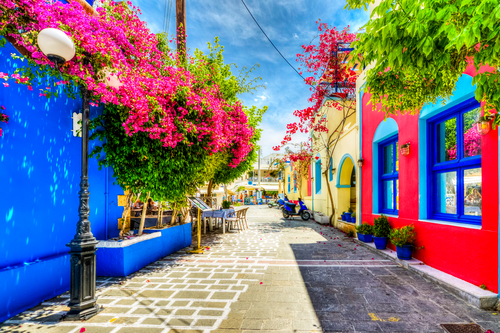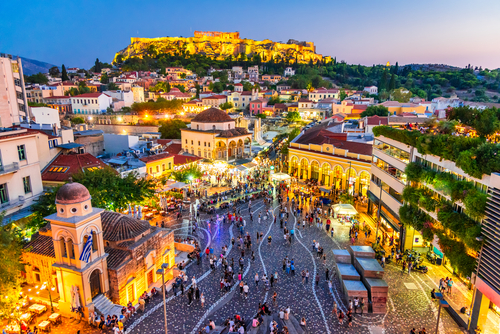During the summer of 2021, the Greek government announced its Digital Nomad Visa. This visa allows foreigners who wish to work remotely from Greece to do so without needing a work visa. Most countries have experienced the rapid growth of the gig economy in recent years.
There are several reasons why freelancers and anyone who owns a foreign company would work in Greece. They enjoy a fairly low cost of living, access to high-speed internet, and favorable tax rates. Greece has a low living cost compared to several European countries. The country also gives freelancers an opportunity to explore and experience Greek culture. They also get to enjoy hassle-free travel within the EU Schengen zone.
The visa enables remote workers to work and live in Greece for up to a year, with the possibility of an extension. It is an excellent option for those looking for a change of scenery and a welcoming environment for remote work. What’s next is a complete guide that will show you all the requirements for this visa, keep reading!
Index
Requirements for a Greek Digital Nomad Visa
Just like any other visa, there are several requirements you need to fulfill before you can get the Nomad Visa in Greece. Go through each requirement and make plans to meet it.
Have a valid passport
Just like with all visas, you must have a valid passport to apply for a digital nomad visa. It must be valid for the entire duration of the visa. Check with your consulate if you have any issues with your passport before continuing with the rest of the steps.
Have proof of remote work
You should show proof of remote work. This can be in the form of a contract or a letter from your employer stating that you work remotely. Alternatively, you can provide evidence that you are self-employed or run your own business; such information could be business registration or tax documents. Unfortunately, one cannot open a Greek company without a visa.
Minimum income
In addition, you should show proof that you are making at least €3,500 per month from your business or freelance activities. This means that you have sufficient income to take care of your basic needs while in Greece. The amount should be enough to provide a decent life and save some money.
If you are bringing a spouse, you need to have at least €4,200/month to take care of the additional needs and responsibilities that come with a spouse. The spouse does not have to work for them to be allowed to enter the country. However, having a working spouse is an added advantage, for they will help offset some of the bills that you will incur in the country.
If you’re bringing a spouse and one dependent, you must meet the minimum income requirement of €4,830 per month. This income proves that you provide for your family’s needs while living in Greece. Like all the cases above, you will need to show proof of income with your bank statements.
Have no criminal background
You should have a clean criminal background when applying for a digital nomad visa. This means that you should not have criminal records in Greece or your country of residence. Greece has strict laws regarding drug offenses along with capital crimes such as homicides and aggravated rape. If you have a criminal record related to these areas, your visa application may be rejected.
The Greece immigration office will seek more information about you from relevant authorities in your home country. Therefore, clear any pending criminal investigations or suits before applying for your visa. Pending cases will have an impact on your ability to get the visa.
Have proof of Health Insurance
You must have proof of health insurance. This ensures that you have access to healthcare in Greece, should you need it. There are several insurance providers that work in Greece from around the country. Alternatively, you can either purchase private health insurance in the country or get international health insurance.
In the same spirit, check if the coverage you have subscribed to is sufficient to work in the country. The cost of healthcare varies across the world.
Proof of accommodation
You must have an address for accommodations in Greece. This can be a hotel reservation, a rental agreement, or a statement from a friend or family member who is hosting you.
Having a friend or family member in the country is the easiest way to get started. However, if you are not getting accommodated by a friend or relative, you can check properties that are open to foreigners from your country.
How to apply for the Greek Digital Nomad Visa?
The Greek Digital Nomad Visa is relatively easy to apply for when you have met all the requirements explained in the section above. Note that you must apply for the visa in person at the closest Greek embassy or consulate in your home country. Here are the detailed steps on how to apply for a Greek Digital Nomad Visa. These steps apply in any country.
Step one: Gather All Required Documents
To apply for a Greek Digital Nomad Visa, you need to prepare the following documents:
- Passport copies: Provide copies of your passport’s personal information and photo pages.
- Passport photos: You are required to submit two recent passport-sized photos.
- Proof of remote work: Provide proof of your remote work, such as a letter from your employer or a client contract.
- Proof of income: Demonstrate your financial means to support yourself while staying in Greece, such as bank statements or tax returns.
- Criminal background check: You should provide a recent criminal background check done in your home country or any country you have lived in for more than six months in the past five years.
- Proof of health insurance: Show proof of health insurance coverage while staying in Greece, which must include medical expenses, hospitalization, and repatriation coverage.
- Medical certificate of good health: Produce a medical certificate from a licensed doctor indicating that you are in relatively good health and do not need specialized care when you come to Greece.
- Address of accommodations in Greece: Provide the address of where you will be accommodated in Greece. This can be a rental agreement or a confirmation from a hotel.
Make sure to gather all the required documents before scheduling an appointment with the Greek consulate in your home country.
Step two: Schedule an appointment
Once all the necessary documents are ready, schedule an appointment with the Greek consulate in your home country. You can do this online or through a phone call. Make sure to bring all the documents with you to the appointment.
Step three: Wait for approval
After submitting your application, wait for approval from the Greek Ministry of Migration and Asylum. The visa application process takes approximately 30 days if there are no issues with your documents. If your application is approved, the Digital Nomad visa allows you to stay in Greece for up to one year.
Step four: Register for a residency permit
Once you arrive in Greece, you must register for a residency permit at the closest Aliens and Immigration Department of the Decentralised Administration office in your residence district. Ensure that you submit your paperwork immediately after arrival. With residence permits, you can stay in Greece for the duration of your visa.
The Greek consulate or embassy in your home country will ask you to pay an application fee of 75€ and an administration fee of 150€. You can pay the fee with several methods available in your country.
When you get your Greek Digital Nomad Visa
Once you have successfully obtained a Greek Digital Nomad Visa, there are a few things to keep in mind. If you are a Greece digital nomad, you are not allowed to leave the country for more than six months consecutively during your stay. If you exceed this time limit, your visa may become invalid and you may face difficulty re-entering Greece or obtaining a new visa in the future.
Second, the digital nomad visa does not automatically grant permanent residency in Greece. You must be a resident of Greece for seven years before becoming eligible for permanent residency. The digital nomad visa offers you an initial residency of up to two years, which can be renewed for another two years. However, beyond that, you will need to check other visa and permit options for long-term residency in Greece. If you stay for at least six months, you will be eligible to pay resident income tax.
Several countries in the European economic area are offering digital nomad visas to qualified foreign nationals who wish to live and work remotely in Europe. Here are some of the best countries in Europe for freelancers and remote workers. Be sure to read our review of the best digital nomad cities in Europe.
- Portugal: This country has a mild climate, beautiful beaches, and an affordable cost of living. All these make it an excellent option for freelancers. The country offers a laid-back lifestyle, a welcoming community, and a growing start-up scene. Its cost of living is 1,000€ – 1,500€ a month. Freelancers can apply for a D7 visa.
- Croatia: Croatia has a rich history, a stunning coastline, and delicious cuisine. For freelancers, it offers a great balance between work and play, with affordable living costs, fast internet, and an abundance of cultural activities. Croatia has a Temporary Stay Visa for freelancers and the cost of living is 1,000€ – 1,500€ a month.
- Czech Republic: The Czech Republic is famous for its charming towns, medieval architecture, and beer culture. You will enjoy a high quality of life, a well-developed infrastructure, and a low cost of living. These features attract international talent. It has a long-term visa for freelancers and the cost of living is between 1,200€ and 1,800€ a month.
- Estonia: Freelancers love Estonia for its cutting-edge technology, efficient public services, and modern infrastructure. Besides, it offers a thriving start-up scene where you can find a supportive community. Estonia’s cost of living is between 1,200€ and 1,500€ a month. It offers e-Residency visa to freelancers.
- Germany: Germany is home to several thriving tech hubs, including Berlin and Munich, and offers a stable and dynamic work environment. The country has an excellent infrastructure, a high standard of living, and a focus on innovation, all of which make it a popular choice for digital nomads. Germany offers a freelance visa to remote workers, with a cost of living raging between 1,200€ and 1,800€ a month.
- Hungary: Hungary is known for its low cost of living, historic architecture, and lively nightlife. For freelancers, it offers a relaxed and friendly atmosphere, a growing start-up ecosystem, and a central location in Europe. The country provides an Entrepreneur Visa to remote workers and its cost of living is about 1,000€ to 1,500€ a month.
- Spain: Spain is famous for its sunny beaches, vibrant culture, and delicious cuisine. The country offers a high quality of life, a diverse range of co-working spaces, and a supportive community of remote groups. It offers a Non-Lucrative visa to foreign freelancers and its cost of living is 1,200€ – 2,000€ a month.
- Iceland: This country has awe-inspiring landscapes, a high standard of living, and a strong focus on environmental sustainability. It offers a peaceful and creative environment, fast internet, and a welcoming community. The cost of living here is quite high at between 2,000€ and 3,000€ a month. Freelancers get a Residence Permit to work in the country.
- Italy: Italy is renowned for its art, architecture, rich history, and world-class cuisine. The country offers a rich cultural experience, a relaxed and welcoming lifestyle, and a thriving start-up scene in cities like Milan and Rome. You need an Elective Residence Visa to work here. The cost of living is between 1,200€ and 1,800€.
- Malta: This English-speaking country has a sunny climate, a relaxed lifestyle, and a welcoming community, which makes it an excellent choice for digital nomads. The country offers fast internet, a diverse range of co-working spaces, and a supportive community to get you moving. Malta offers a Nomad Residence Permit for foreign remote workers and the cost of living is between 1,000€ and 1,500€ a month.
- Romania: Romania is known for its stunning natural scenery, affordable living costs, and vibrant tech industry. Freelancers enjoy a great work-life balance, fast internet, and a growing community of digital nomads. Romania offers a long-stay visa to remote workers. The cost of living here ranges between 800€ and 1,200€ a month.
- Norway: Norway has breathtaking fjords, a high standard of living, and a strong focus on work-life balance. It is a peaceful and inspiring destination for digital nomads thanks to its supportive community, growing start-up scene, and unique cultural experience. You need a Residence Permit for Self-Employed Persons to work remotely in Norway. The cost of living is between 1,500€ and 2,500€ a month.
If you are wondering how to live in Europe, consider researching any of the above countries.
Don’t travel without insurance
Insuring your health is a top priority, especially when traveling or living abroad. When applying for a Digital Nomad visa, it is mandatory to provide proof of medical and travel insurance. That’s why Heymondo Long Stay Travel Insurance is an excellent option for digital nomads. Our coverage includes medical expenses, and protection for lost or stolen luggage, all of which give you peace of mind during your stay in a foreign country.
Heymondo Long Stay Travel Insurance is a comprehensive insurance policy that is specifically designed for freelancers and long-term travelers. It provides coverage for several medical expenses, including emergency medical treatment, hospitalization, and medical repatriation, whenever there is a need. Additionally, the policy covers the loss, theft, or damage of your luggage, personal belongings, and electronics. You can even customize your policy to suit your individual needs. For example, you can choose the amount of medical coverage you need, select additional coverage for high-value items, or add on extra coverage for adventure sports.
Heymondo Long Stay Travel Insurance also offers 24/7 assistance and support, so you can rest assured that you’ll have access to help if you need it. In addition, the policy is available for both individuals and families. You can also purchase it for up to a year, which makes it a flexible option for digital nomads who may be traveling for extended periods of time.
Featured stories


















